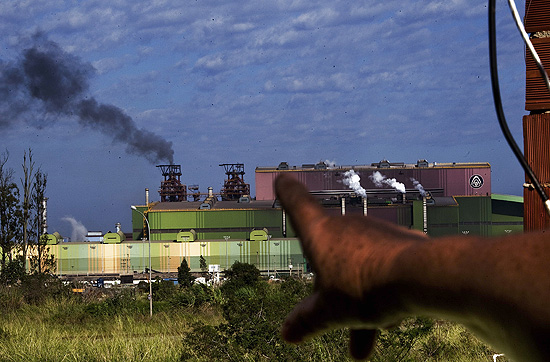Latest Photo Galleries
Brazilian Markets
17h38 Bovespa |
+0,02% | 124.196 |
16h43 Gold |
0,00% | 117 |
17h00 Dollar |
+0,15% | 5,2507 |
16h30 Euro |
+0,49% | 2,65250 |
ADVERTISING
Tour takes visitors to see "toxic" companies
06/16/2012 - 13h23
Advertising
LAURA CAPRIGLIONE
SPECIAL REPORT FROM RIO DE JANEIRO
The charter bus pulled out of the Largo da Carioca station in the middle of Rio, full of militant environmentalists. The group wasn't headed off to the one of the addresses scattered around the city hosting Rio+20 events, but rather to the indigent neighborhood of Santa Cruz, beside Sepetiba Bay, in the eastern part of the city. Objective: to participate in a different kind of tour, to Rio+Toxic.
The idea was to show that just a few kilometers from where the heads of state were meeting at Rio+20, these environmentalists could find, in their words, true "environmental hells."
For Thursday's tour, the focus was the Atlantic ThyssenKrupp Steel Company (TKCSA), a steelworking plant that started operations in 2010.
| Marlene Bergamo/Folhapress | ||
 |
||
| Some neighbors said that the dust from the factory contaminates their lungs |
SHINY DUST
According to the Institute of Alternative Politics for the Southern Cone, which organized the excursion, TKCSA spews particles of pig iron into the air with tons of carbonic gas.
"Every day we have shiny dust pouring out here," said Maria Julia Barreto, 62, to a group of French "environmental tourists."
"Shiny dust" is how the local people refer to the dust that, according to them, comes out of the steelworking plant. The shine comes from particles of iron.
Some neighbors said that the dust contaminates their lungs. "It was the destruction of Sepetiba Bay," said fisherman Ozeas Marinho, 81.
ThyssenKrupp denies any problem with any emissions from their steelworking plant.
Translated by ANNA EDGERTON




